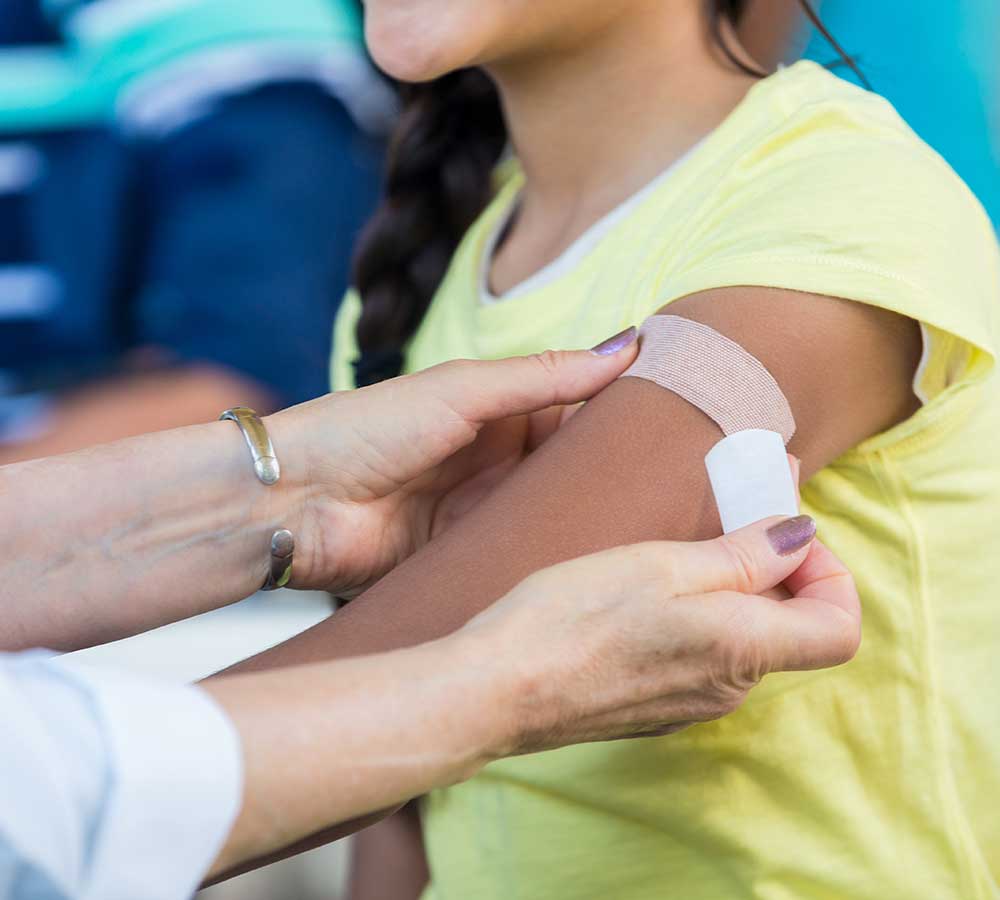Find a flu clinic near you.
Plan your flu shot today and be ready for flu season. Our walk-in and by-appointment immunization clinics can help protect you and your family from influenza. Some locations can even get you your COVID-19 vaccination at the same visit if needed. Find your nearest clinic by clicking the links below.
We offer flu shots in Washington:
Grandview →
Granger →
Tri-Cities →
Toppenish →
Prosser →
Spokane →
Sunnyside →
Wapato →
Yakima →
Other locations:
Hermiston →

Get answers to your questions about the flu.
Annual flu vaccination is recommended for everyone 6 months and older, with few exceptions.
CDC recommends use of any licensed, age-appropriate flu vaccine during the 2021-2022 flu season, including inactivated flu vaccine, high-dose flu vaccine, adjuvanted flu vaccine, recombinant flu vaccine, and nasal spray flu vaccine. Vaccination should not be delayed for a specific vaccine product when another age-appropriate vaccine is available.
September and October are generally good times to be vaccinated. Ideally, everyone should be vaccinated by the end of October.
Flu and COVID-19 are both contagious respiratory illnesses, but they are caused by different viruses. COVID-19 is caused by infection with a coronavirus (called SARS-CoV-2) and seasonal flu (most often just called “flu”) is caused by infection with one of many influenza viruses that spread annually among people. Because some symptoms of flu and COVID-19 are similar, people may need to be tested to tell what virus is causing their illness. People can be infected with both a flu virus and the virus that causes COVID-19 at the same time. In general, COVID-19 seems to spread more easily than flu and causes more serious illnesses in some people. Compared with people who have flu infections, people who have COVID-19 can take longer to show symptoms and be contagious for longer.
While it’s not possible to say with certainty what will happen in the fall and winter, CDC believes it’s likely that flu viruses and the virus that causes COVID-19 will both be spreading at that time. Relaxed COVID-19 mitigation measures (such as stay-at-home orders, or mask mandates) may result in an increase in flu activity during the upcoming 2021–2022 flu season. Common respiratory viruses such as respiratory syncytial virus (RSV) and human coronaviruses (not SARS-CoV-2) did not spread as much as usual during the 2020-2021 flu season as in past seasons. However, data from the National Respiratory and Enteric Surveillance System (NREVSS) showed an increase in these viruses’ activity during the summer, outside of their usual seasonal increases. This information is summarized in a Morbidity and Mortality Weekly Report, Changes in Influenza and Other Respiratory Virus Activity During the Pandemic.
Yes. It is possible to have flu and other respiratory illnesses like COVID-19 at the same time. Health experts are still studying how common this is. Some of the symptoms of flu and COVID-19 are similar, making it hard to tell the difference between them based on symptoms alone. Diagnostic testing can help determine if you are sick with flu or COVID-19.
Because COVID-19 is still a relatively new illness, we have little information about how flu illness might affect a person’s risk of getting COVID-19. We do know that people can be infected with flu viruses and the virus that causes COVID-19 at the same time. Getting a flu vaccine is the best protection against flu and its potentially serious complications, and getting a COVID-19 vaccine is the best protection against COVID-19.
Your health care provider may order a test to help confirm whether you have flu or COVID-19 or some other illness.
Flu vaccines are not designed to protect against COVID-19. Flu vaccination reduces the risk of flu illness, hospitalization and death in addition to other important benefits. Likewise, getting a COVID-19 vaccine is the best protection against COVID-19, but those vaccines are not designed to protect against flu. Visit the CDC’s Frequently Asked Questions page for information about COVID-19 vaccinations.
No. There is no evidence that getting a flu vaccination raises your risk of getting sick from COVID-19 or any other coronavirus. (Common human coronaviruses usually cause mild to moderate upper-respiratory tract illnesses, like the common cold.)
Yes. Getting a flu vaccine is an essential part of protecting your health and your family’s health every year. Take recommended precautions to protect yourself from COVID-19 while getting your flu vaccine.
Yes. Wearing a mask and physical distancing can help protect you and others from respiratory viruses, like flu and the virus that causes COVID-19. However, the best way to reduce your risk of flu illness and its potentially serious complications is for everyone 6 months and older to get a flu vaccine each year. By getting a flu vaccine, you may also be protecting people around you who are more vulnerable to serious flu complications.
Yes, you can get a COVID-19 vaccine and a flu vaccine at the same time if they are both offered at the clinic. Even though both vaccines can be given at the same visit, people should follow the recommended schedule for either vaccine: If you haven’t gotten your currently recommended doses of COVID-19 vaccine, get a COVID-19 vaccine as soon as you can, and ideally get a flu vaccine by the end of October.
While limited data exist on giving COVID-19 vaccines with other vaccines, including flu vaccines, experience with giving other vaccines together has shown the way our bodies develop protection and possible side effects are generally similar whether vaccines are given alone or with other vaccines. If you have concerns about getting both vaccines at the same time, you should speak with a provider.
